
Ten Important Years of European Security
Professor at the University of Trento, Italy
The European “constitutional” law of security is characterised by many faults, inconveniences, drawbacks and shortcomings in practically all of its elements: there is, it appears, a lack of efficiency and at the same time a lack of legitimacy in establishing rules and taking decisions, a lack of effectiveness in implementing them, a lack of adequate legal tools for the protection of rights of citizens and of individuals against such rules and decisions. The vices, which affect the legitimacy as well as the effectiveness of the EU law, are mainly due to the present pillar structure, and so there is reasonable hope that most of them could be eliminated by “communitarising” the whole matter of the present third pillar: which is what the new TFEU is going to do, so providing an efficient and legitimate constitutional framework for the future development of the European law of security. Notwithstanding the constitutional shortcomings, the European law of security has achieved significant results both in terms of distribution of tasks and in terms of organisational arrangements. The developments of the last ten years, both in the Treaties and in the secondary legislation, seem to have produced an important shift in the way we perceive the EU, and what is around it. With all its shortcomings and inconveniences the policy of security has proved, and is likely to prove further, to represent an essential element in determining a fundamental change in the concept and idea of what European Union is, and is expected to be by its citizens.





















